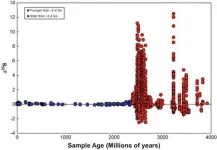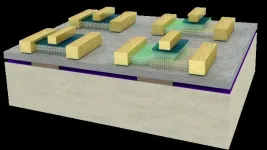(Press-News.org) UNIVERSITY PARK, Pa. — Kenneth Davis, professor of atmospheric and climate science at Penn State, will lead a team of 23 investigators from 13 research institutions in a new field campaign supported by the U.S. Department of Energy (DOE) to study surface-atmosphere interactions around Baltimore, Maryland, to see how they influence the city’s climate. The new campaign, called the Coast-Urban-Rural Atmospheric Gradient Experiment (CoURAGE), is expected to start in October 2024 and run through September 2025.
CoURAGE will contribute to the Baltimore Social-Environmental Collaborative (BSEC), one of four recently funded DOE Urban Integrated Field Laboratories. BSEC and the three other urban laboratories, located in Arizona, Texas and Illinois, will expand the understanding of climate and weather events and their impact on urban systems.
Davis is the principal investigator for Penn State’s portion of the multi-institutional BSEC laboratory, led by Johns Hopkins University. The CoURAGE science team includes Benjamin Zaitchik, Johns Hopkins professor and BSEC’s principal investigator, along with nine BSEC co-investigators.
With its aging infrastructure, growing susceptibility to heat and flooding, and ongoing issues with air and water pollution, Baltimore is characteristic of many large industrial cities in the Eastern United States. This was a motivating factor in deciding to propose an urban laboratory in Baltimore, Davis said.
“It’s a city that needs to adapt to thrive in a changing climate,” Davis said. “The city also needs sound evidence regarding options for climate change mitigation — options like urban greening. We also need to partner to generate climate science that addresses the priorities of people and neighborhoods in the city that historically have been neglected. Many of our cities face these challenges.”
BSEC will collect long-term data on the urban atmosphere and land-atmosphere interactions. However, it does not have enough resources to observe all the important variables within the city, nor can it cover “the neighbors,” as Davis put it — the atmospheric environments upwind of Baltimore that affect the city’s climate.
DOE’s Atmospheric Radiation Measurement (ARM) user facility will provide instruments and infrastructure for CoURAGE. During CoURAGE, ARM instruments will help provide coverage where BSEC cannot, forming much of what the campaign’s science team calls “a four-node regional atmospheric observatory network.”
CoURAGE is expected to include three ARM nodes. The primary node will be located in Baltimore at Morgan State University’s Clifton Park site, where ARM will operate a portable observatory consisting of instruments, shelters and data and communications systems.
Two nodes will be smaller observational arrays located at key sites outside the city. One will be located in a rural area northwest of Baltimore, on land typical of the plains found between the coast and the foothills of the Appalachian Mountains. Air at this this rural site is often carried into Baltimore by the prevailing winds. The other site will be on an island in the Chesapeake Bay designed to sample atmospheric conditions representative of the bay, the southeastern boundary of the Baltimore metropolitan area.
The fourth node will be an existing long-term observatory operated in Beltsville, Maryland, by Howard University and the Maryland Department of the Environment. Located north of Washington D.C., the observatory will measure the air that is carried into Baltimore when the winds come from the southwest, traveling across the nation’s capital.
With data from multiple sites, CoURAGE will be able to document the degree to which different surface conditions around the region can change Baltimore’s atmospheric environment, according to Davis.
“The CoURAGE campaign will be an important contribution to BER’s urban initiative,” said DOE ARM Program Manager Sally McFarlane. “The ARM observations will help improve understanding of atmospheric processes in urban regions, the surface and environmental conditions that drive them, and how our models of urban systems need to be improved.”
The team will collect what it calls impact and process measurements. Impact measurements are tied to conditions that directly affect residents, such as microclimate, air quality or street flooding in a particular area.
“Those are the properties we want to get right in order to understand the environment people live in,” Davis said. “Most of ARM’s data will be process measurements. These measurements will help scientists determine whether they are getting the right answers in models for the right reasons.”
Davis said his BSEC colleagues have found that wealthier neighborhoods have more existing climate and air quality measurements, so they are focused on putting instruments in lower-income parts of Baltimore. The plan could evolve as the BSEC team hears more from stakeholders in the city.
The project’s community engagement team, led by Tonya Sanders Thach and Samia Kirchner, professors at Morgan State University; Genee Smith, professor at Johns Hopkins University; and Lisa Iulo, associate professor of architecture at Penn State, has gathered a steering committee that includes a broad array of community members and representatives of city government to guide the scientific effort. The steering committee, in turn, connects BSEC, and now CoURAGE, with a diverse cross-section of Baltimore residents to engage in knowledge co-generation, citizen science activities and educational programs.
Other Penn State faculty who are part of CoURAGE are Kelly Lombardo, Natasha Miles, Ying Pan, John Peters, and Scott Richardson, all faculty in the College of Earth and Mineral Sciences’ Department of Meteorology and Atmospheric Science.
ARM’s last urban campaign, the TRacking Aerosol Convection interactions ExpeRiment (TRACER), took place around Houston, Texas, from October 2021 through September 2022. Led by Penn State alum Michael Jensen, a meteorologist at Brookhaven Lab in New York, TRACER studied the effects of aerosols on storms in the Houston area. Jensen is now a co-investigator for CoURAGE.
The other institutions whose investigators will contribute to CoURAGE include Brookhaven National Laboratory, City College of New York, Columbia University, Howard University, Johns Hopkins University, Morgan State University, NOAA’s Earth System Research Laboratory, Princeton University, University at Albany, University of Maryland, Baltimore County, University of Maryland, College Park and University of Texas at Austin.
END
Penn State professor to lead field campaign to study climate in Baltimore area
Kenneth Davis will spearhead the DOE-funded project to investigate influence of surface-atmosphere interactions
2023-08-31
ELSE PRESS RELEASES FROM THIS DATE:
Covid pandemic may have changed the gut bacteria of infants, research finds
2023-08-31
Infants who spent most of their first year in the pandemic have fewer types of bacteria in their gut than infants born earlier, according to a team of developmental psychology researchers.
The findings, published in Scientific Reports, showed that infants whose gut microbes were sampled during the pandemic had lower alpha diversity of the gut microbiome, meaning that there were fewer species of bacteria in the gut. The infants had a lower abundance of Pasteurellaceae and Haemophilus—bacteria that live within humans and can cause various infections—and significantly different beta diversity, which tells us how similar or dissimilar the gut microbiome for ...
New blood test gives very high accuracy to screen for Alzheimer’s disease
2023-08-31
A new blood test called p-tau217 shows promise as an Alzheimer's disease biomarker, and when used in a two-step workflow very high accuracy to either identify or exclude brain amyloidosis, the most important and earliest pathology. That is an innovation now presented by researchers at the University of Gothenburg, together with colleagues at University of Lund and in Montreal, Canada.
In recent years, a lot of effort has been put on developing biomarkers in blood that could potentially help to identify Alzheimer’s disease (AD). Tau protein, ...
Antioxidants stimulate blood flow in tumors
2023-08-31
Vitamin C and other antioxidants stimulate the formation of new blood vessels in lung cancer tumours, a new study from Karolinska Institutet published in The Journal of Clinical Investigation shows. The discovery corroborates the idea that dietary supplements containing antioxidants can accelerate tumour growth and metastasis.
“We’ve found that antioxidants activate a mechanism that causes cancer tumours to form new blood vessels, which is surprising, since it was previously thought that antioxidants have a protective effect,” says study leader Martin Bergö, professor at the ...
Talk therapy with other moms an effective treatment for postpartum depression, McMaster research shows
2023-08-31
HAMILTON, ON (Aug. 31, 2023) – An innovative model of care that offers new mothers psychotherapy delivered by other mothers who have also experienced post-partum depression (PPD) should be implemented in clinical practice, according to researchers at McMaster University.
Researchers worked with nearly 200 mothers over a year and a half, during the height of the COVID-19 pandemic, and found those receiving treatment from their peers were 11 times more likely to experience remission of their major depressive disorder. The findings of the randomized control trial are published in Acta Psychiatrica Scandinavica.
PPD and its associated symptoms affect ...
Single-dose psilocybin treatment for major depressive disorder
2023-08-31
About The Study: In a randomized clinical trial with 104 participants, psilocybin treatment was associated with a clinically significant sustained reduction in depressive symptoms and functional disability, without serious adverse events. These findings add to increasing evidence that psilocybin—when administered with psychological support—may hold promise as a novel intervention for major depressive disorder.
Authors: Charles L. Raison, M.D., of Usona Institute in Fitchburg, Wisconsin, is the corresponding author.
To access the embargoed study: Visit our For The Media website at ...
Deaths due to COVID-19 in patients with cancer during different waves of the pandemic in the US
2023-08-31
About The Study: The findings of this study suggest that patients with cancer had a disparate burden of COVID-19 mortality during the winter Omicron wave compared with the general U.S. population. With the emergence of new, immune-evasive SARS-CoV-2 variants, many of which are anticipated to be resistant to monoclonal antibody treatments, strategies to prevent COVID-19 transmission should remain a high priority.
Authors: Chi-Fu Jeffrey Yang, M.D., of Massachusetts General Hospital in Boston, is the corresponding ...
New research reveals Earth's ancient ‘breath’: Study reveals connection between atmospheric changes and mantle chemistry
2023-08-31
An international team of scientists have uncovered an important link between Earth’s early atmosphere and the chemistry of its deep mantle.
The study, which was led by researchers at the University of Portsmouth and University of Montpellier, sheds new light on the evolution of life on our planet and the rise of atmospheric oxygen.
The team investigated magmas formed in ancient subduction zones, where portions of Earth’s crust sink back into the mantle, from a pivotal moment in Earth's history – the Great Oxidation Event (GOE). This event, which is estimated to have happened between 2.1 ...
Discovery opens possibility of new ion channel-targeting drugs
2023-08-31
Ion channels are attractive drug targets due to their importance in health and disease, but finding ways to target a specific ion channel selectively is a major challenge. Now, researchers at Weill Cornell Medicine and RMIT University in Australia have discovered that ion channels called BK channels have unique openings in their sides, which drug molecules may be able to access. The finding, published Aug. 31 in Nature Chemical Biology, could lead to the development of selective drugs that target the BK channel to treat ...
Analog and digital: The best of both worlds in one energy-efficient system
2023-08-31
We live in an analog world of continuous information flow that is both processed and stored by our brains at the same time, but our devices process information digitally in the form of discrete binary code, breaking the information into little bits (or bites). Researchers at EPFL have revealed a pioneering technology that combines the potential of continuous analog processing with the precision of digital devices. By seamlessly integratingultra-thin, two-dimensional semiconductors with ferroelectric materials, the research, published in Nature Electronics, unveils a novel way to improve energy efficiency and add new functionalities in computing. The ...
Coastal fisheries show surprising resilience to marine heat waves
2023-08-31
Rutgers-led research found that marine heat waves – prolonged periods of unusually warm ocean temperatures – haven’t had a lasting effect on the fish communities that feed most of the world.
The finding is in stark contrast to the devastating effects seen on other marine ecosystems cataloged by scientists after similar periods of warming, including widespread coral bleaching and harmful algal blooms.
“There is an emerging sense that the oceans do have some resilience, and while they are changing in response ...
LAST 30 PRESS RELEASES:
Scientists show how to predict world’s deadly scorpion hotspots
ASU researchers to lead AAAS panel on water insecurity in the United States
ASU professor Anne Stone to present at AAAS Conference in Phoenix on ancient origins of modern disease
Proposals for exploring viruses and skin as the next experimental quantum frontiers share US$30,000 science award
ASU researchers showcase scalable tech solutions for older adults living alone with cognitive decline at AAAS 2026
Scientists identify smooth regional trends in fruit fly survival strategies
Antipathy toward snakes? Your parents likely talked you into that at an early age
Sylvester Cancer Tip Sheet for Feb. 2026
Online exposure to medical misinformation concentrated among older adults
Telehealth improves access to genetic services for adult survivors of childhood cancers
Outdated mortality benchmarks risk missing early signs of famine and delay recognizing mass starvation
Newly discovered bacterium converts carbon dioxide into chemicals using electricity
Flipping and reversing mini-proteins could improve disease treatment
Scientists reveal major hidden source of atmospheric nitrogen pollution in fragile lake basin
Biochar emerges as a powerful tool for soil carbon neutrality and climate mitigation
Tiny cell messengers show big promise for safer protein and gene delivery
AMS releases statement regarding the decision to rescind EPA’s 2009 Endangerment Finding
Parents’ alcohol and drug use influences their children’s consumption, research shows
Modular assembly of chiral nitrogen-bridged rings achieved by palladium-catalyzed diastereoselective and enantioselective cascade cyclization reactions
Promoting civic engagement
AMS Science Preview: Hurricane slowdown, school snow days
Deforestation in the Amazon raises the surface temperature by 3 °C during the dry season
Model more accurately maps the impact of frost on corn crops
How did humans develop sharp vision? Lab-grown retinas show likely answer
Sour grapes? Taste, experience of sour foods depends on individual consumer
At AAAS, professor Krystal Tsosie argues the future of science must be Indigenous-led
From the lab to the living room: Decoding Parkinson’s patients movements in the real world
Research advances in porous materials, as highlighted in the 2025 Nobel Prize in Chemistry
Sally C. Morton, executive vice president of ASU Knowledge Enterprise, presents a bold and practical framework for moving research from discovery to real-world impact
Biochemical parameters in patients with diabetic nephropathy versus individuals with diabetes alone, non-diabetic nephropathy, and healthy controls
[Press-News.org] Penn State professor to lead field campaign to study climate in Baltimore areaKenneth Davis will spearhead the DOE-funded project to investigate influence of surface-atmosphere interactions



